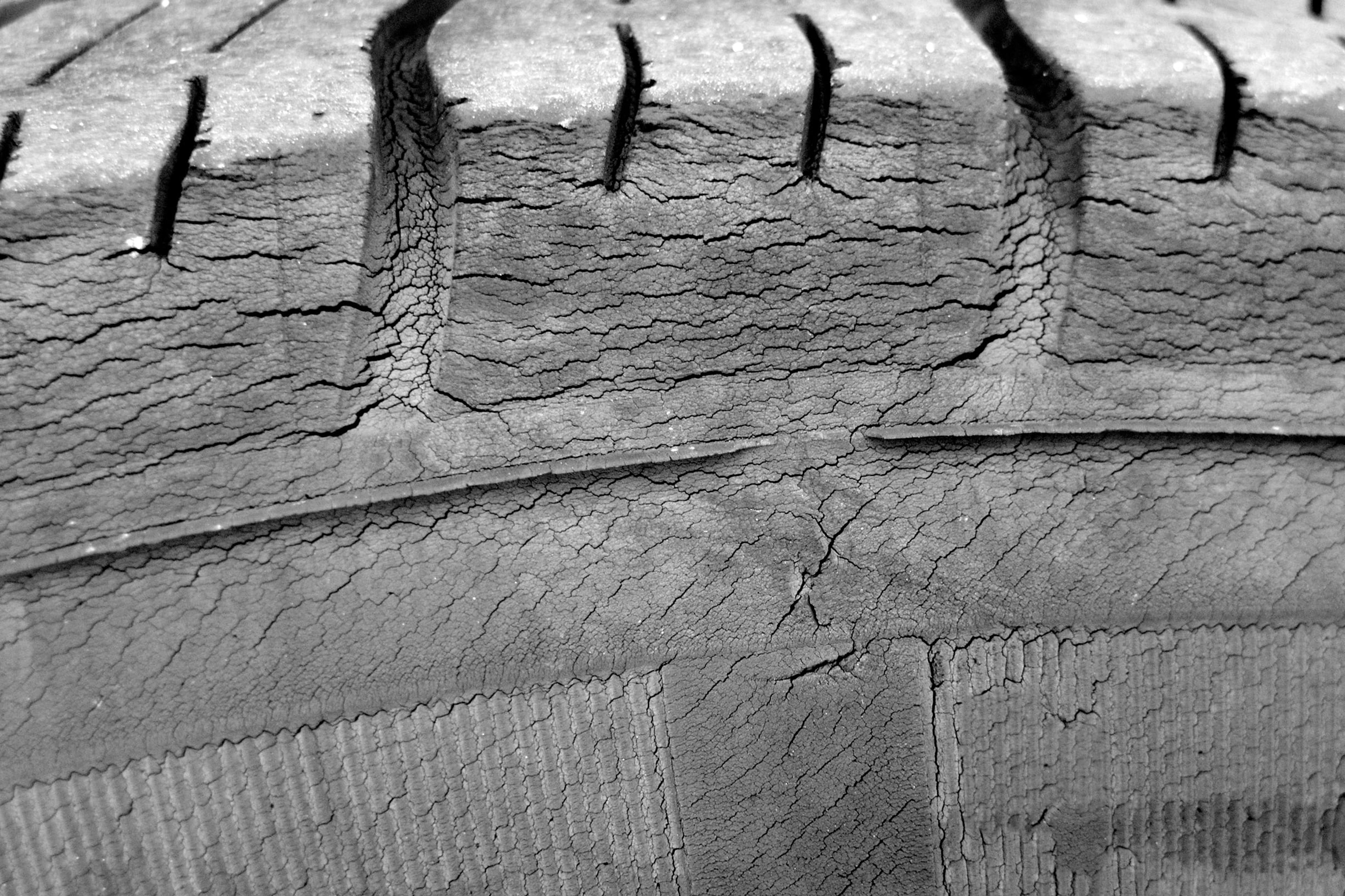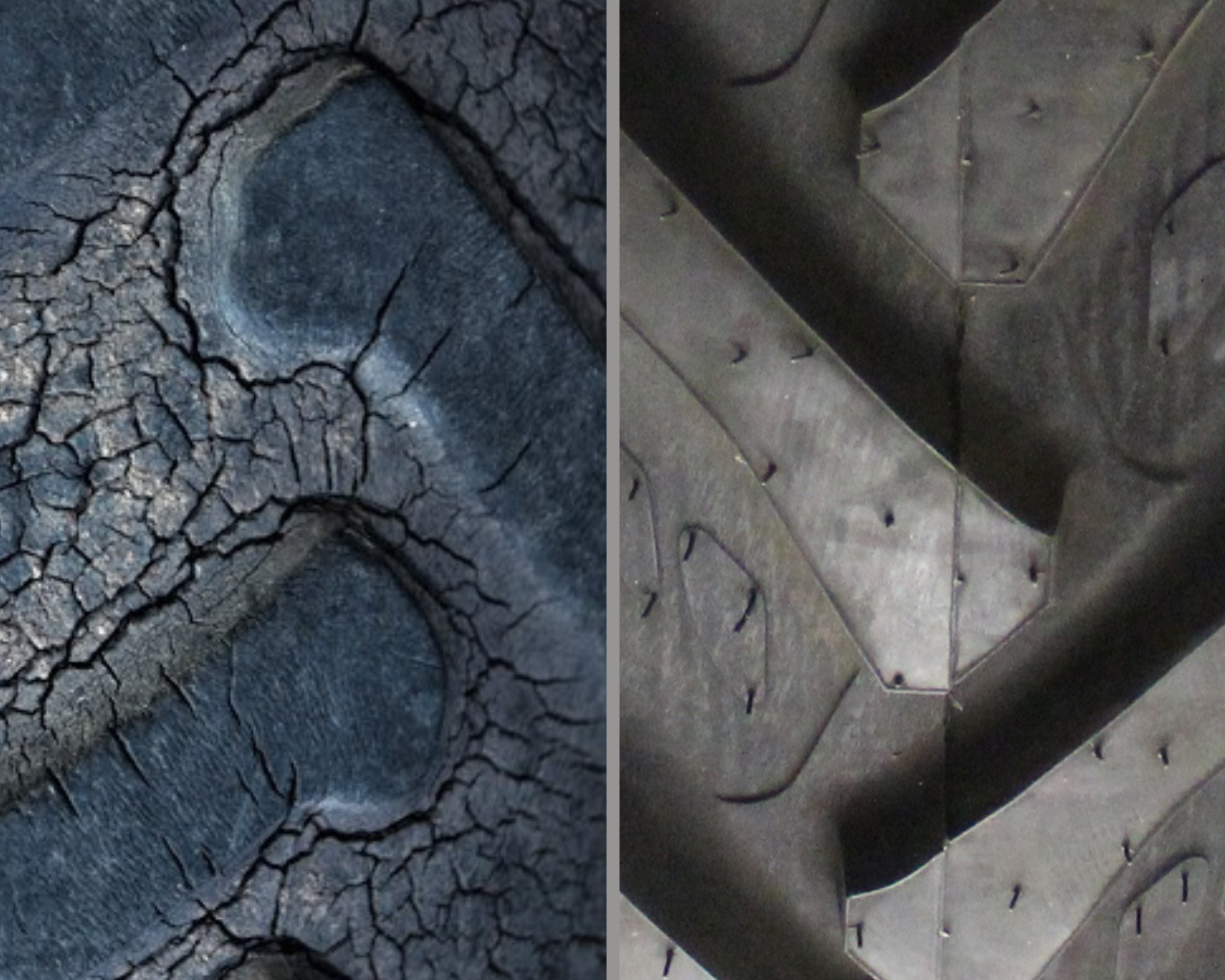Tire maintenance & safety
Cracked Tires: Identification, Causes & Solutions
Are your tires beginning to crack? Is it something you need to take seriously? Here’s your introductory guide to understanding cracked tires.

Free shipping
Best price guarantee
SimpleCrew exclusive savings
0% financing options
Tire replacement coverage
24/7 roadside assistance
Easy returns
Tire maintenance & safety
Are your tires beginning to crack? Is it something you need to take seriously? Here’s your introductory guide to understanding cracked tires.

Tires are the only point of contact between your vehicle and the road. They play a critical role in ensuring a safe and comfortable ride. However, over time, tires can develop cracks that may compromise their structural integrity and performance.
Cracked tires are not just a cosmetic issue; they can pose serious safety risks. Ignoring or failing to address tire cracks can lead to blowouts, reduced traction, and even accidents.
In this article, we'll dive into the world of cracked tires—exploring what they are, how to identify them, and the steps you should take to ensure your safety on the road.
Cracked tires are tires that have visible lines or splits on their surface. These cracks can appear on various parts of the tire, including the tread, sidewalls, and shoulders. The presence of cracks indicates that the tire is aging and its structure may be weakening.
Tire cracks develop due to a combination of factors. Exposure to the elements, such as UV light, heat, and chemicals, can cause the rubber compounds in tires to deteriorate over time. This process, known as dry rot, is a common culprit behind cracked tires. It's important to note that while some superficial cracks may not pose an immediate danger, they should not be ignored. Even small cracks can worsen over time, compromising the tire's ability to perform safely and effectively.

Identifying cracked tires requires a thorough visual inspection. Start by examining the tire's surface, paying close attention to both the tread and sidewalls. Look for any signs of small lines or splits in the rubber.
To ensure you don't miss any cracks, use a flashlight to illuminate the tire's surface, especially in low-light conditions. This will help you spot cracks that may be harder to see with the naked eye.
Keep in mind that cracks can vary in size and severity. Some may be shallow and barely noticeable, while others can be deep and extensive. If you're unsure about the severity of the cracks, it's always best to have a professional tire inspection performed by a trusted tire retailer, such as SimpleTire, to get an expert opinion.
Ensuring your tires are in peak condition involves careful examination. Start by focusing on the tire's tread area, which can often show early signs of wear and tear. Tread issues can affect traction and vehicle safety, especially in adverse conditions. These imperfections might manifest as tiny, hairline fractures along the tread's grooves.
Shift your attention to the tire sidewalls next. Cracks here can be more telling of a tire’s overall durability and health. Inspect both the inner and outer sidewalls meticulously. Even minor damage in this area can rapidly escalate, posing risks of blowouts or air seepage.
For a detailed inspection, especially in dim lighting, use a flashlight. This tool will help highlight any subtle or hidden damage that might be missed otherwise. Consistent checks, aided by proper lighting, ensure your tires maintain their safety and performance over time.
Tire cracks can emerge from several factors that gradually weaken the rubber. Prolonged exposure to sunlight can lead to the breakdown of rubber compounds, causing the surface to become fragile. High temperatures can further exacerbate this effect, making the tire more prone to developing cracks. Additionally, certain road conditions and substances might contribute to the degradation of the tire material if not cleaned regularly.
Aging is another factor that leads to tire deterioration. As tires get older, they naturally lose their flexibility and strength, which can result in cracks forming over time. Keeping track of a tire's lifespan and being aware of signs of aging can help manage this issue before it becomes problematic.
Proper tire maintenance is crucial in preventing cracks. Failing to maintain the correct inflation can lead to increased stress and heat build-up, accelerating wear. Overloading the vehicle also places undue pressure on the tires, making them more susceptible to damage. Ensuring the right tire pressure and adhering to weight limits can significantly reduce the risk of cracking.
Determining the severity of tire cracks involves examining their characteristics and potential impact. Start by inspecting the depth and spread of the cracks. Small, surface-level cracks generally indicate the natural aging of the tire. These are typically not an immediate concern but do suggest that the tire's material is slowly degrading and should be watched over time.
In contrast, cracks that penetrate deeper into the tire or are widespread across its surface are more alarming. Such extensive damage compromises the tire's ability to function safely, heightening the likelihood of failure under stress. These conditions often result from prolonged exposure to harsh environmental factors or significant mechanical stress.
If there is any uncertainty regarding the severity of the cracks, consulting with a tire professional is advisable. Their expertise can provide a detailed assessment of the tire's condition and recommend whether replacement is necessary to maintain safety and performance on the road.
When considering tire crack repair options, it is crucial to recognize that such solutions mainly address aesthetics. Products that promise to fill in cracks only improve the tire's appearance without enhancing its structural soundness. Relying on these superficial fixes can lead to a false sense of security, potentially resulting in unexpected tire failures.
For tires with extensive cracking, opting for replacement is the most prudent decision. Significant cracks compromise the tire's durability and performance, increasing the risk of blowouts and loss of vehicle control. Installing new tires ensures reliable traction and safety, particularly in challenging driving conditions.
In cases where cracks are minor and confined, ongoing observation is necessary. Regular checks help detect any changes that might necessitate future replacement, allowing vehicle owners to make informed decisions that balance safety and cost-effectiveness.
Taking proactive measures is essential to extend a tire’s lifespan and prevent cracking. Clean tires regularly using gentle methods to remove potentially damaging substances. This practice not only keeps the tires looking good but also prevents contaminants from embedding in the rubber. Avoid using products with strong chemicals that may degrade the tire’s surface, as these can strip away essential oils that maintain flexibility.
Reducing exposure to harsh environmental conditions can significantly preserve tire quality. Parking in covered areas or using tire covers when outdoors can shield tires from harmful UV rays. If neither is available, positioning the vehicle strategically to minimize direct sunlight can also help. These simple practices can delay the onset of cracking and contribute to long-term durability.
Keeping tires properly inflated ensures they operate under optimal conditions. Regular pressure checks, as recommended by the vehicle manufacturer, prevent unnecessary stress that can lead to damage. Additionally, avoid placing excessive loads on your vehicle, as overloading can exacerbate wear and lead to structural issues over time.
Performing regular checks helps in identifying potential issues early on. Aim to examine your tires each month, focusing on the overall condition and looking for any irregularities. These routine assessments can spot minor cracks before they worsen. For a thorough inspection, ensure you have adequate lighting to see all parts of the tire clearly. This approach aids in discovering hidden or subtle signs of wear that might otherwise be overlooked.
Beyond washing, tire care includes protective measures against environmental damage. Clean your tires with gentle products to remove debris without harming the rubber. When considering parking options, opt for locations that provide shelter from direct sunlight, which can intensify cracking. Utilizing garages or portable covers can help maintain the tire's integrity and prolong its lifespan. These actions collectively contribute to preserving tire quality and ensuring consistent performance.
While cracked tires can be a cause for concern, understanding how to identify and address them is key to maintaining your vehicle's safety. By following these steps and tips, you can extend the life of your tires and enjoy a smooth, worry-free ride. If you're in need of new tires, shop for tires online with us and let our experts help you find the best deals to keep you rolling with confidence.
Tire cracking is often caused by age, exposure to harsh weather conditions, or improper maintenance. Over time, the rubber in the tires tends to deteriorate, leading to cracks.
Not all tire cracks are dangerous, but it is important to have them evaluated by a professional. Superficial hairline cracks may not pose an immediate threat, but deeper and more severe cracks compromise the structural integrity of the tire.
Search By